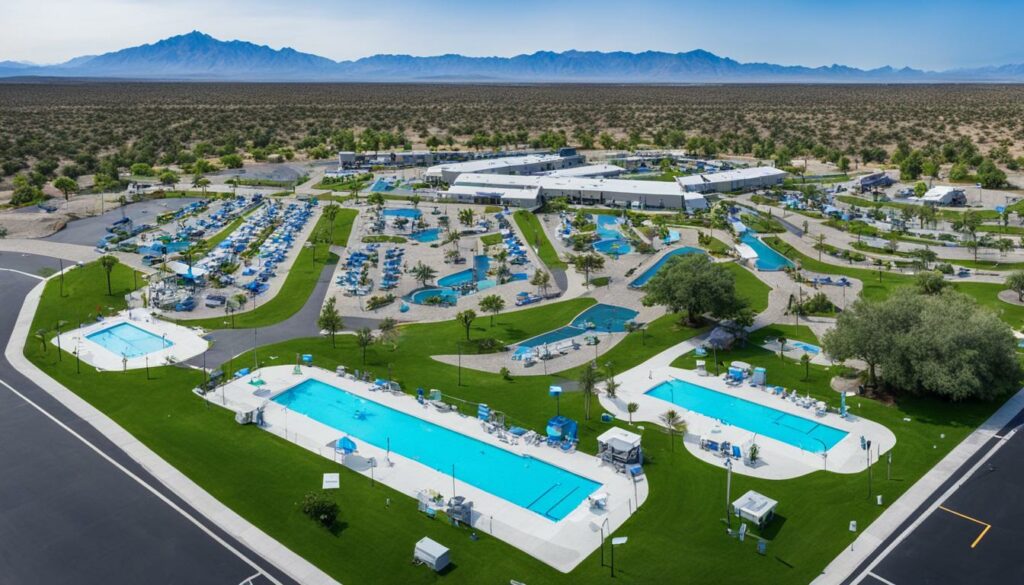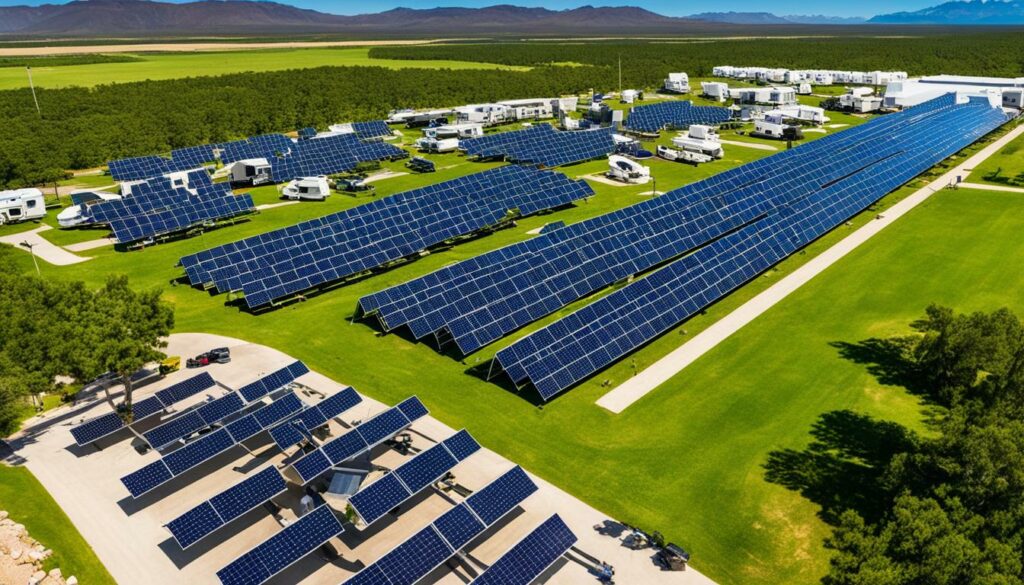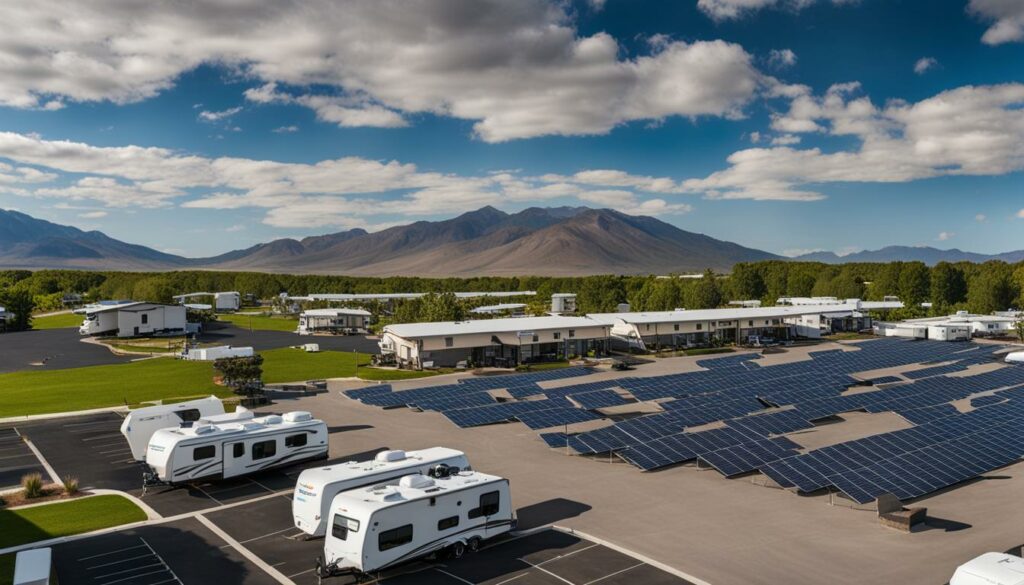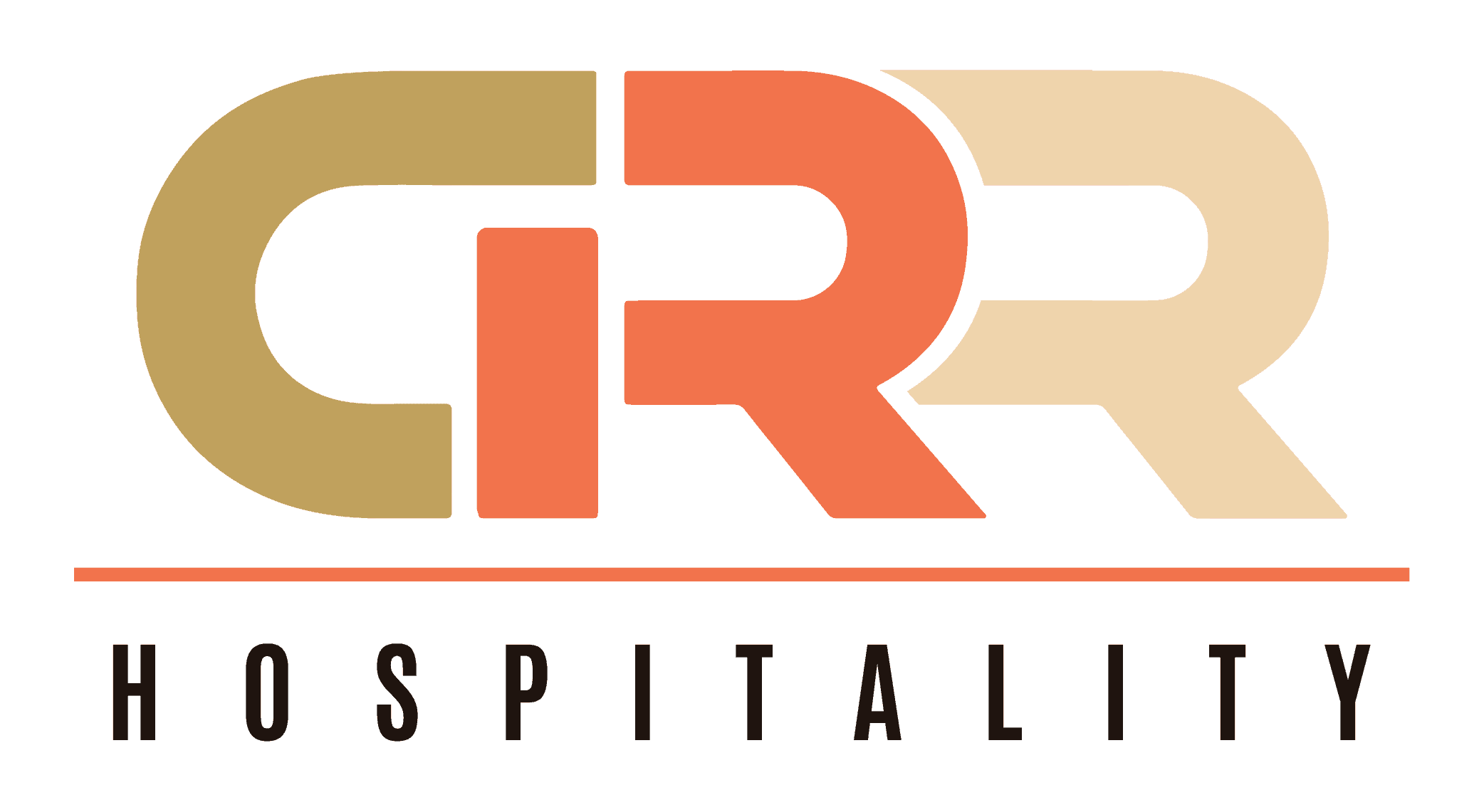In the highly competitive market of RV parks, optimizing operational costs is critical for a sustained profitable business. With rising expenses, achieving profitability requires a comprehensive strategy to minimize costs while maximizing revenue potential. This comprehensive guide offers actionable insights and cost reduction strategies that RV park managers can implement to enhance operational efficiency and profitability.
This guide provides an overview of various strategies that will help RV park owners and managers identify feasible ways to optimize operational costs without impacting overall quality and customer experience. It covers the importance of monitoring key performance indicators, implementing cost control measures, and conducting regular financial reviews to proactively identify areas for improvement.
Key Takeaways
- Minimizing operational costs plays a crucial role in enhancing the profitability of RV parks.
- RV park operators can evaluate existing operating costs for potential reduction opportunities.
- Implementing energy conservation strategies, leveraging technology, and optimizing staffing can lead to considerable cost savings.
- Effective monitoring and control of operational costs through performance indicators and financial reviews are imperative.
- Marketers can boost revenue and offset operating costs by exploring alternative revenue streams.
Understanding the Importance of Cost Control in RV Park Operations

Effective expense management is critical for the long-term sustainability and profitability of RV parks. Operating costs can quickly add up and erode the bottom line if not kept in check. Inefficient expense management can also negatively impact the guest experience, which can ultimately lead to reduced revenues and a declining business.
RV park owners and managers must adopt operational efficiency techniques to optimize costs and maximize profits. By focusing on cost reduction strategies, RV park operators can achieve a sustainable business model that benefits both the business and its guests.
Implementing cost control measures is a multifaceted approach that requires analyzing operational costs, setting priorities, and implementing strategies to reduce expenses. RV park owners and managers must evaluate every aspect of their operations, including staffing, facilities, and technology usage, to identify areas where costs can be reduced.
Overall, cost control is essential for long-term viability and success in the RV park industry, and it starts with understanding the importance of optimizing operating expenses.
Analyzing Current Operating Costs

Controlling expenses is a critical aspect of managing RV parks efficiently. Conducting a comprehensive analysis of operating costs is the first step to identify areas for cost optimization. RV park operators need to identify cost drivers, measure and monitor the costs, examine the cause of the higher costs, and identify new cost reduction opportunities. Analyzing current operating costs allows operators to make informed decisions about reducing expenses while maintaining guest satisfaction.
One of the main cost drivers for RV park owners is utilities, such as electricity, water, and gas. Operators should compare their utility usage to industry benchmarks and track their monthly consumption to identify opportunities for reducing utility expenses. They can also look for opportunities to implement energy-efficient practices to conserve resources and reduce utility costs.
Another significant source of operating costs is maintenance and repair expenses, which are incurred regularly to keep the facilities in top condition. By monitoring repair and maintenance expenses, RV park operators can create a schedule to minimize costs while ensuring that facilities remain in excellent working condition. Prioritizing maintenance tasks based on guest demand and need can help RV park operators identify the tasks that would yield the greatest cost savings.
RV park operators should ensure they have sufficient data to make a proper cost analysis. They need to track all purchase and inventory records systematically. With this data, they can identify the volume of purchases, suppliers, and determine the products sold that yield higher returns on their investment.
Table: Operating cost breakdown for an average RV park in the United States.
| Expense Category | Percentage |
|---|---|
| Utilities | 18% |
| Labor and Staffing | 15% |
| Maintenance and Repair | 12% |
| Insurance and Taxes | 10% |
| Marketing and Promotions | 8% |
| Supplies and Equipment | 7% |
| Credit Card Fees | 2.5% |
The table above illustrates the typical operating cost breakdown for an average RV park in the United States. Utilities, labor and staffing, maintenance and repair, insurance and taxes, marketing and promotions, supplies and equipment, and credit card fees account for a significant portion of the total expenses.
By conducting a thorough analysis of operating costs, RV park operators can identify cost reduction opportunities and optimize their expenses. They can streamline expenses on labor and staffing by cross-training employees and using technology to automate operations, implement cost-saving measures such as energy-efficient practices and water conservation techniques, renegotiate supplier contracts, and evaluate marketing and promotion strategies.
Cost Optimization Strategies for RV Park Amenities and Facilities

RV parks offer a range of amenities and facilities to attract guests and improve their experience. However, managing and maintaining these amenities can be expensive. Implementing cost-saving measures for RV park amenities and facilities can significantly reduce operating costs and improve profitability. Here are some strategies that RV park operators can consider:
Evaluate Energy Usage
One of the major expenses associated with RV park amenities and facilities is energy consumption. To minimize energy costs, RV park operators can invest in energy-efficient appliances, lighting systems, and HVAC systems. Additionally, they can install automated lighting systems equipped with motion sensors to limit energy waste.
Implement Water Conservation Measures
Another way to minimize expenses associated with RV park amenities and facilities is to implement water conservation measures. This includes installing low-flow showerheads, faucets, and toilets. Additionally, RV park operators can install automated irrigation systems that utilize weather and soil moisture sensors to minimize water waste.
Optimize Maintenance Schedules
Maintaining amenities and facilities is essential to ensure guest satisfaction and reduce potential liabilities. However, routine maintenance can be expensive and time-consuming. By optimizing maintenance schedules, RV park operators can reduce operating costs and improve productivity. This includes reducing the frequency of routine maintenance tasks, such as mowing and landscaping, and prioritizing essential tasks like electrical and plumbing repairs.
By implementing these cost optimization strategies, RV park operators can reduce operating costs without compromising guest satisfaction. Moreover, they can create a sustainable business model that is profitable in the long run.
Streamlining Staffing and Labor Costs

Staffing and labor costs are a significant expense for RV parks, but there are ways to optimize these costs. By doing so, RV park owners can achieve considerable savings without compromising guest satisfaction. In this section, we will explore some techniques for streamlining staffing and labor costs in RV parks.
Optimizing Staff Scheduling
Efficient staff scheduling is essential to optimize labor costs in RV parks. Owners and managers should consider using software applications that can help automate staff scheduling, monitor staff availability, and ensure proper shift coverage to help ensure labor costs do not exceed the budget.
Tip: Encourage transparency and two-way communication with your employees when it comes to scheduling. They can assist in identifying areas for improvement.
Cross-Training Employees
Cross-training employees is another effective way to streamline staffing in RV parks. By training employees to perform a variety of tasks, owners and managers can reduce the need for specialized staff and minimize labor costs. By cross-training employees, the operations of the RV park can continue efficiently even when employees are absent or unavailable.
Tip: Optimize your cross-training program by introducing it during slow seasons or periods so that employees can cover multiple tasks when the park is at full capacity.
Leveraging Technology for Automation and Streamlining Operations
Technology can greatly assist with streamlining operations in RV parks, leading to significant improvements in operational costs. RV park owners and managers should consider using property management and campground software that can automate essential tasks such as reservations management, housekeeping, and maintenance, which can eliminate manual errors, minimize the workload, and simplify operations.
Tip: Utilize scheduling software to optimize staff time and reduce errors; for example, scheduling housekeeping staff to clean occupied sites in between reservations.
By implementing these techniques, RV park operators can optimize their staffing and labor costs resulting in a more efficient operation without compromising guest satisfaction.
Leveraging Technology for Operational Efficiency
The growing use of technology has played a critical role in optimizing operational costs for RV parks. By automating and streamlining different tasks, RV park operators can significantly reduce expenses across the board. This section explores some of the most effective technological solutions for optimizing operational costs in RV parks.
Campground Management Software
Campground management software is an essential tool for RV park operators looking to optimize costs. By automating tasks such as reservations, check-ins, and payments, campground management software can significantly reduce manual errors and enhance efficiency. Some of the most popular campground management software solutions available include:
| Software Name | Description |
|---|---|
| RezExpert | A comprehensive software solution that offers reservation management, online booking, payment processing, and POS integration. |
| Campground Master | A user-friendly software solution that offers customizable reservation management, accounting, and reporting features. |
| RecPro | A simple yet effective software solution that offers reservation management, POS integration, and guest tracking features. |
Online Reservations Systems
Online reservations systems are another excellent technological solution for optimizing operational costs in RV parks. By offering guests an easy-to-use online booking platform, RV park operators can reduce the workload for staff while also enhancing the overall guest experience. Some of the most popular online reservation systems available include:
- ResNexus
- RoverPass
- Booking.com
Energy Management Systems
Another area where technology can help optimize operational costs is energy management. By implementing an energy management system, RV park operators can monitor and control energy usage to reduce expenses. Some of the key features of energy management systems include:
- Real-time monitoring of energy usage
- Automated controls for heating, cooling, and lighting systems
- Alerts for abnormal energy consumption or equipment malfunctions
Leveraging technology is one of the most effective ways to optimize operational costs for RV parks. By automating tasks, reducing manual errors, and enhancing efficiency, RV park operators can reduce expenses while also improving the overall guest experience.
Marketing and Revenue Generation Strategies
In today’s competitive campground market, it’s more critical than ever to explore cost reduction strategies and expense management for campgrounds. One approach is to adopt marketing and revenue generation strategies that can help RV park operators reduce operational costs while increasing revenue.
Effective promotional campaigns are a cornerstone of any marketing strategy. RV park operators should use a targeted approach, creating promotions that appeal to their target market. This can include highlighting unique amenities and features of the campground, offering seasonal discounts, or running referral programs.
Upselling opportunities are another valuable revenue generation strategy that can contribute to cost reduction in RV park operations. For example, offering an upsell package that includes firewood delivery, bike rentals, or other extras can increase revenue per guest while also improving the overall guest experience.
Finally, exploring alternative revenue streams can help RV park operators offset operating costs. This may include partnering with local vendors to offer on-site services or hosting events that generate revenue. It’s important to identify revenue-generating opportunities that align with the campground’s overall branding and target market.
Implementing marketing and revenue generation strategies is just one of many cost reduction strategies available to RV park operators. By maximizing revenue and minimizing expenses with these techniques, RV park operators can ensure the long-term sustainability and profitability of their businesses.
Negotiating Supplier Contracts and Procurement
When it comes to reducing expenses in campground operations, optimizing supplier contracts and procurement can yield significant cost savings. Effective contract management ensures favorable terms with vendors, allowing RV park operators to negotiate prices and reduce operating costs.
The first step in optimizing procurement is evaluating suppliers. RV park owners and managers can identify the most cost-effective suppliers by examining supplier pricing, quality, and delivery performance. By selecting suppliers with a track record of reliable service, RV parks can reduce operational downtime, prevent disruptions, and avoid costly errors.
After identifying the most suitable suppliers, negotiating favorable terms is critical to achieving cost savings. This involves preparing a contract that clearly outlines the scope of services, purchasing obligations, and payment terms, among others. With well-negotiated contracts, RV parks can lock in advantageous terms and reduce expenses.
Efficient procurement and inventory management
Efficient procurement and inventory management are instrumental in reducing operating costs for RV parks. By developing an inventory management system, RV park operators can optimize stock levels, eliminate waste, and reduce inventory holding costs.
An inventory management system should be easy to use, efficient, and integrated with the procurement process. This facilitates forecasting demand, identifying slow-moving stock, and developing strategies for effective purchasing.
Reducing expenses in campground operations is essential to achieving long-term sustainability.
Monitoring and Controlling Operational Costs
Effective cost control in RV park operations requires ongoing monitoring and control of operational expenses. Successful management of operational costs requires regular tracking of key performance indicators. By doing so, RV park operators can understand the areas of their operations that are most cost-intensive and make necessary adjustments.
To optimize operational costs in RV parks, consider implementing the following tips:
- Track revenue and expenses: Maintaining accurate and up-to-date financial records is crucial for effective cost control. By tracking sources of revenue and expenses, operators can develop a better understanding of their operations’ financial health.
- Conduct financial reviews: Regular financial reviews help operators identify areas where expenses can be reduced or revenue increased. These reviews should include an analysis of monthly revenue and expense reports.
- Implement cost controls: Implementing strict cost controls can significantly reduce operational expenses. Consider measures such as establishing spending limits, reducing energy consumption, or consolidating services.
Examples of Key Performance Indicators:
RV park operators should consider tracking the following key performance indicators to optimize cost control:
| KPI | Description |
|---|---|
| Occupancy Rate | The percentage of sites being occupied at a given time. A high occupancy rate indicates a healthy RV park business. |
| Average Daily Rate (ADR) | The average amount of revenue generated per occupied site. A higher ADR results in higher revenue. |
| Revenue per Available Site (RevPAS) | The total revenue generated divided by the number of available sites. A higher RevPAS indicates more efficient use of available resources. |
By monitoring operational costs and key performance indicators, RV park operators can make data-driven decisions to optimize cost control and improve profitability.
Conclusion
Optimizing operational costs is crucial for the success and sustainability of RV parks. By implementing cost-saving measures and exploring various strategies, RV park operators can improve profitability and create a sustainable business model. To achieve this, ongoing monitoring and control of operational costs is essential.
RV park operators should evaluate their current operating costs and identify major cost drivers. By analyzing current expenses, they can gain insights into potential opportunities for cost optimization. Strategies for minimizing operating costs in RV park amenities and facilities, streamlining staffing and labor costs, leveraging technology for operational efficiency, negotiating supplier contracts and procurement, and marketing and revenue generation can also contribute to cost reduction in RV park operations.
RV park operators must continuously strive for operational excellence and take corrective actions to improve their bottom line. Implementing cost-saving measures can be a challenging task, but it can lead to significant cost savings and a sustainable business model in the long run. By optimizing operational costs, RV park operators can ensure the success and profitability of their businesses.
Therefore, it’s imperative for RV park owners and managers to focus on optimizing operational costs to achieve sustainable and profitable business operations.
FAQ
Why is cost control important in RV park operations?
Cost control is crucial in RV park operations to ensure profitability and sustainability. Inefficient expense management can significantly impact the bottom line of a campground. By implementing cost control measures, RV park owners and managers can optimize expenses and improve overall operational efficiency.
How can I analyze current operating costs in my RV park?
Analyzing current operating costs involves conducting a comprehensive assessment of major cost drivers and expense categories. By identifying areas where expenses can be reduced or optimized, RV park operators can uncover opportunities for cost savings and operational improvement.
What are some strategies for optimizing costs related to RV park amenities and facilities?
To optimize costs related to RV park amenities and facilities, operators can evaluate energy usage, implement water conservation measures, and optimize maintenance schedules. Other strategies may include exploring partnerships with suppliers and vendors to negotiate favorable terms and pricing.
How can I streamline staffing and labor costs in my RV park?
Streamlining staffing and labor costs can be achieved by optimizing staff scheduling, cross-training employees to perform multiple roles, and utilizing technology to automate and streamline operations. Effective labor management can help reduce expenses without compromising guest satisfaction.
How can technology contribute to operational efficiency and cost optimization in RV parks?
Technology plays a crucial role in optimizing operational costs for RV parks. Implementing campground management software, online reservation systems, and energy management systems can enhance efficiency, reduce manual errors, and result in significant cost savings over time.
What marketing and revenue generation strategies can help reduce costs in RV park operations?
Implementing effective marketing campaigns, exploring upselling opportunities, and diversifying revenue streams can contribute to cost reduction in RV park operations. By attracting more guests and maximizing revenue potential, operators can offset operating costs and improve overall profitability.
How can negotiating supplier contracts and optimizing procurement processes help reduce expenses in campground operations?
Negotiating favorable supplier contracts and optimizing procurement processes can lead to significant cost savings in campground operations. Evaluating suppliers, negotiating competitive pricing and terms, and efficiently managing inventory can help reduce expenses and improve overall operational efficiency.
Why is it important to monitor and control operational costs in RV parks?
Monitoring and controlling operational costs is vital in RV parks to proactively identify areas for improvement and mitigate unnecessary expenses. By tracking key performance indicators, implementing cost control measures, and conducting regular financial reviews, operators can optimize their costs and maintain financial stability.





